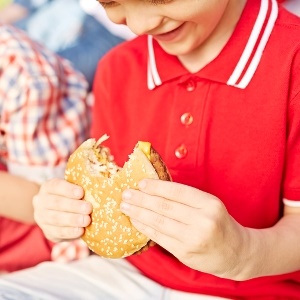
The United Nations (UN) has called on governments of its member states to outlaw the marketing of unhealthy foods and drinks to children.
Commercial stimuli
The UN believes that children should not be tempted by advertising campaigns that promote junk food.
Advertisements directed at children “can cause unhealthy consumer behaviour to become ingrained at an early age” and this could “condition children to respond later in life to commercial stimuli by purchasing unnecessary products” without considering the health or financial implications, according to the UN’s Juan Pablo Bohoslavsky and Dainius Püras.
“We call on [UN member] States to ban advertising, promotion and sponsorship by manufacturers of alcohol, tobacco, and unhealthy foods in schools and in the context of children’s sporting events and other events that could be attended by children,” they said.
Read: Indigenous superfoods for rural children
Already over two thirds of South African women are overweight or obese – a condition that the World Health Organisation links to life-threatening illnesses like heart disease, diabetes, stroke and some cancers.
An estimated 16.7 percent of local school children are overweight or obese with rates expected to rise with age, according to a 2015 study published in the online medical journal BioMed Central.
Over-consumption and indebtedness
As the world marks International Youth Day today (August 12), Bohoslavsky, the UN’s expert on foreign debt and human rights, and Püras, UN Special Rapporteur on the Right to Health, urged countries to “regulate advertising directed at children, in conformity with the duty of States to protect children from material injurious to their well-being”.
The UN warned that commercial advertising “instils at an early age a culture of over-consumption and indebtedness”.
Read: 4 vitamins and nutrients you absolutely need
“In many countries, family private debt has become a serious problem, rendering basic necessities unaffordable to certain individuals.”
South Africans borrowed more than any other country in 2014, according to data from the World Bank. More than 11 million people were classified as over-indebted compared to 5 million in 2013.
The UN warns that a high volume of child-directed adverts could lead to situations where children pressure their parents to buy unbudgeted-for items “often at the expense of other important household needs”.
This can lead to far wider-reaching implications “as excessive household debt can easily spill over into a public debt crisis affecting an entire population”.
Some restrictions already implemented
A 2011 United Nations Children’s Fund study conducted in the UK, Sweden and Spain found that just acquiring more goods does not make a child happier, especially in the face of health complications related to obesity and unbalanced nutrition.
Countries like Brazil, Canada, Denmark and Norway have already restricted some forms of child-directed marketing.
In South Africa, since 2008 there have been changes to the Advertising Code of Practice limiting the marketing of unhealthy foods to children.
Read: How to read food labels
Currently these restrictions are limited to children who are 12 years old or younger. But the National Department of Health (NDoH) has set a target to reduce the number of people who are overweight or obese by 10 percent by the year 2020 and has been working with the Consumer Goods Council of South Africa (CGCSA) to expand these regulations.
In a draft document published in 2014, the department proposed to further limit such marketing and increase the age stipulation from 12 and under to all school going children.
The CGCSA’s Francina Makhaone said that they are “unable to comment in detail on the regulations as they are still in draft form” but that they and and other industry bodies are working with the NDoH “on a range of initiatives through the Healthy Food Options Forum that support the manufacture of, and facilitate access to, foods and non-alcoholic beverages that contribute to a healthy diet as part of a healthy lifestyle”.
According NDoH spokesperson Joe Maila, “what needs to be done is to do away with harmful advertising of unhealthy stuff to our children as part of the prevention and control of obesity”. “We want to develop a health conscious nation.”
The UN urged all governments to act: “Such commercial messages have the potential to shape children’s long term consumer and financial behaviour, and they are growing in number and reach.” – Health-e News.
Read more:
Try these healthy, quick workday lunches
10 foods to boost your immune system




 Publications
Publications
 Partners
Partners














